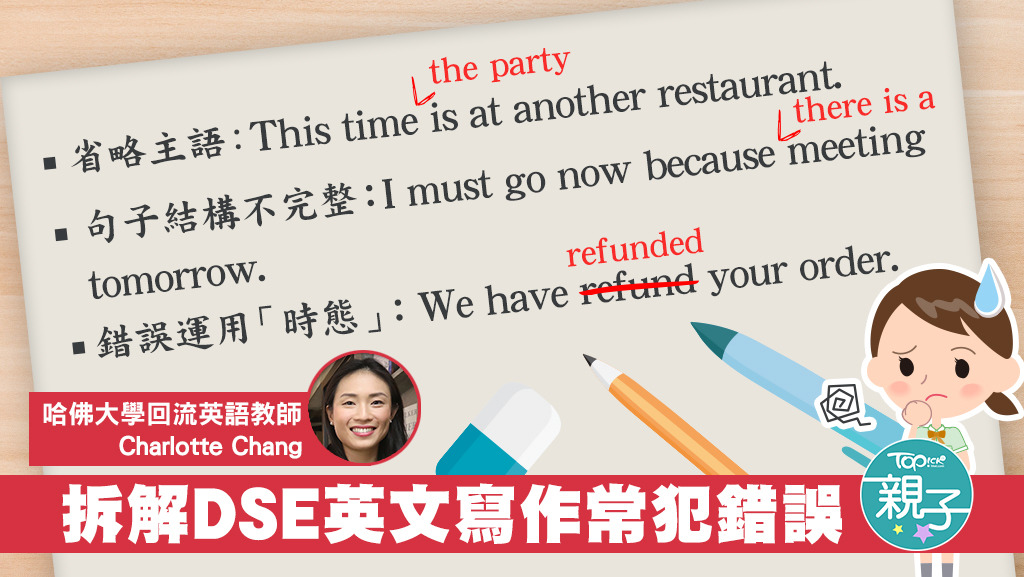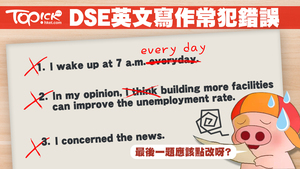句子欠主語錯用時態 英文老師拆解DSE英文寫作4大常犯錯誤
發布時間: 2019/02/18 16:24
最後更新: 2020/05/18 12:33

▲ Charlotte為DSE考生拆解英文寫作常犯錯誤。
DSE文憑試已逐漸臨近,英文是其中一科核心科目,而學生在DSE英文寫作卷中時有出現錯誤。在最後的備戰階段,要如何加強英文寫作實力?
TOPick請來畢業於美國哈佛大學、前拔萃女書院英文老師、Ms. Charlotte Academy創辦人Charlotte Chang,拆解DSE考生、甚至在職人士也常犯的錯處。
Charlotte指出,DSE考生在英文寫作最常犯的錯誤有4個,包括省略主語、句子結構不完整、錯誤運用時態及子句配搭錯誤。
1. 省略主語
很多港生會以中文的思維方式寫英文,往往誤用中文結構去表達,而最明顯的是省略主語。Charlotte舉例,過往曾有學生發電郵向她請教問題,卻寫成「If don't know the number, can ask you?」,把主語省略後,根本無法明白意思。
另外,以往有作文題目要求考生撰寫邀請函,邀請人去一個派對。有學生寫「This time is at another restaurant.」,看似沒有問題,因為翻成中文是「這次在另一間餐廳舉行」。
英文的子句(clause)不能沒有主語,「This time」不是主語,而是一個副詞,因此句子應改成「This time the party is at another restaurant.」。
2. 句子結構不完整
學生會用連接詞把兩句子句連起,但很多時連接詞後面的子句不完整。
例子:「I must go now because early meeting tomorrow.」
「because」是連接詞,所以後面一定是整個子句,「early meeting tomorrow」不是子句,應改成「because there is a meeting tomorrow」。
另外,當用到英文關係子句(relative clauses)時,一個子句是用於描述另一子句中的名詞,然而不少學生卻常忘記完成外面的子句。
例子:「The meeting which I attended yesterday at the head office together with all the other colleagues」
句子中有兩句「子句」,「which I attended yesterday at the head office together with all the other colleagues」是句子中間的子句,但外面的子句不完整,只有「The meeting」,應改成「The meeting which I attended yesterday at the head office together with all the other colleagues was boring.」
3. 錯誤運用「時態」
Charlotte指出,英文子句的限定動詞(Finite Verbs),必須配合主語及有正確的時態(tenses)、動作的狀態(aspect)、主動/被動(active/passive voice)、語氣(mood),所謂「語氣」即問句、假設句、陳述句等。
然而學生往往錯誤運用時態,出現不存在的字形。
例子:We have refund your order.
「have refund」是不存在的字形,正確應是「have refunded」。
例子:During your working holiday, a work permit will offer.
這句錯用了「voice」,「work permit」(工作簽證)不可能主動「offer」(提供),因此應改為「a work permit will be offered」。
4. 介詞後詞類配搭錯誤
英文的介詞(Preposition)一定要連同名詞組(noun phrase)組成修飾語,介詞後不會有其他詞類出現。
例子:I am looking forward to hear from you soon.
「to」有兩個文法角色,其中一個是介詞。當它是介詞的時候,它和其他介詞一樣,後面要跟名詞組,所以「hear」不對,所有動詞加「ing」字尾就會衍生出名詞「hearing」,變成「looking forward to hearing from you」。
例子:This room is for meet clients.
「for」是介詞,後面必須跟名詞組,因此要在動詞加上「ing」,即「This room is for meeting clients」。
例子:He came to the office despite it is his day off.
「despite」不是連接詞,而是介詞,後面必須為名詞組,應改為「He came to the office despite his day off」或「despite being on holiday」。
撰文 : 林愛娜 TOPick記者









